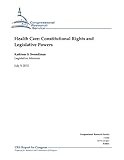Health Care: Constitutional Rights and Legislative Powers
The health care reform debate raises many complex issues including those of coverage, accessibility, cost, accountability, and quality of health care. Underlying these policy considerations are issues regarding the status of health care as a constitutional or legal right. This report analyzes constitutional and legal issues pertaining to a right to health care, as well as the power of Congress to enact and fund health care programs. The United States Supreme Court’s decision in NFIB v. Sebelius, which upheld most of the Patient Protection and Affordable Care Act (Affordable Care Act/ACA), is also discussed.
The United States Constitution does not set forth an explicit right to health care, and the Supreme Court has never interpreted the Constitution as guaranteeing a right to health care services from the government for those who cannot afford it. The Supreme Court has, however, held that the government has an obligation to provide medical care in certain limited circumstances, such as for prisoners.
Congress has enacted numerous statutes, such as Medicare, Medicaid, and the Children’s Health Insurance Program, that establish and define specific statutory rights of individuals to receive health care services from the government. As a major component of many health care entitlement statutes, Congress has provided funding to pay for the health services provided under law. Most of these statutes have been enacted pursuant to Congress’s authority to “make all Laws which shall be necessary and proper” to carry out its mandate “to … provide for the … general Welfare.” Congress has also used other constitutional powers, such as its power to regulate interstate commerce and its power to levy taxes, to enact legislation relating to health insurance and health care.
In 2010, Congress enacted the Affordable Care Act, a comprehensive health care reform law which includes a requirement, effective in 2014, that most individuals purchase health insurance, and which significantly expands the Medicaid program. A number of lawsuits were filed challenging various provisions of this legislation, and, on June 28, 2012, the Supreme Court upheld the majority of ACA’s provisions. Significantly, the Court upheld the requirement that individuals purchase health insurance as a valid exercise of Congress’ taxing power, but the Court limited Congress’ power to spend for the general welfare by holding that Congress cannot threaten the states with the loss of all federal Medicaid funds if the states decline to expand Medicaid coverage as mandated by ACA.
In addition, several states have passed laws, amended their state constitutions, or entered into interstate compacts to attempt to “nullify” or “opt out” of the federal individual health insurance mandate and other federal health care provisions. Direct conflicts between federal laws and state nullification statutes or state constitutional amendments would raise constitutional issues which are likely to be resolved in favor of federal law under the Supremacy Clause of the United States Constitution.
A number of state constitutions contain provisions relating to health and the provision of health care services. State constitutions may provide constitutional rights that are more expansive than those found under the federal Constitution since federal rights set the minimum standards for the states.
Price:
Popular Posts:
- How are Human Rights related to Healthcare?
- G, 0820540722, Bioethics: Health Care, Human Rights, and the Law (Casebook Serie
- Long-Term Care and the Law: A Legal Guide for Health Care Professionals, Pozgar,
- Long-Term Care and the Law: A Legal Guide for Health Care Professionals, Pozgar,
- The Burdens of Justice in Family, Education, Health Care, and Law Vol. 9 by…

